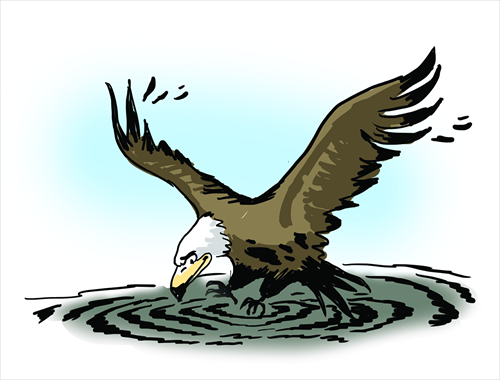Vietnam, Iraq show limits of interventionism

Illustration: Liu Rui/GT
In 1975, the US' official involvement in Vietnam came to an end in one of the most haunting and humiliating images of the modern era, that of the last helicopter departing the US' Saigon embassy before the city's fall to the forces of North Vietnam. Recent events in Iraq are creating an eerie parallel to the events that led to that long ago moment.
Just as in Vietnam, the US found itself trapped in what seemed to be a never-ending quagmire in Iraq, and the question of how to remove US troops from the nation became a major political issue.
Just as in Vietnam, the Iraqi government has proven both politically corrupt and militarily incompetent despite abundant military aid.
And just as in Vietnam, the central Iraqi government appears to be in danger of falling to its enemies without direct foreign support.
Perhaps most importantly, like Vietnam, the US justification for intervention in Iraq was the result of unclear thinking about the situation.
Additionally, a policy of half-truths and lies was used to suppress those who questioned the wisdom of entering into an open-ended military commitment.
In both Iraq and Vietnam, by the time it became plain just how serious an error had been made, the US was too deeply involved to easily extricate itself from the resultant quagmire.
Of course, there are differences between the current situation in Iraq and the end of the Vietnam War.
The need for the Islamic State of Iraq and the Levant (ISIL) to consolidate its gains may slow its rate of advance, and this primarily Sunni-backed group may find itself unable to expand into majority Shia regions of Iraq.
However, at best this could indicate a return to the savage ethnic conflicts that plagued much of Iraq after the fall of Saddam Hussein.
At worst, it could see Iraq fall into the same anarchy that is currently plaguing Libya as the Shiite majority comes to lose trust in the government's ability to secure the nation.
The question of whether or not the US will reenter this conflict is also an open one.
Iraqi Prime Minister Nouri al-Maliki may very well now be willing to reconsider his 2011 decision against allowing the US to maintain bases within Iraq.
However, with the 2016 US presidential election getting ever closer, it is unlikely in the extreme that the either the Democratic or Republican parties would be willing to return to Iraq, given the US public's hostility to this idea. Even the use of air power might very well prove impossible in the current political climate.
Should Maliki seek aid from Iran, he will only continue the process of moving Iraq away from US orbit into a closer relationship with Iran.
Such a move would greatly increase Iran's bargaining power in its current negotiations over its nuclear program.
For the US, an Iraq that is both allied to and dependent on Iran might be seen as being very little worse than an Iraq that has fallen to the ISIL or into general chaos.
While Iran and the US are both firmly opposed to the ISIL, the long history of hostility between the two nations makes profitable collaboration in this matter unlikely.
This has resulted in a situation where over a decade after the US overthrew Saddam Hussein, the US' actions have not led to a resurgence of democracy.
Rather the region is less stable than ever before, while ethnic and religious tensions are at an all-time high.
It is unlikely that there is an easy way to retrieve the situation in Iraq at this point.
Even if the central Iraqi government does not fall, it will be critically weakened by these events.
The citizens of Iraq will find it difficult to trust the government to protect them after entire divisions melted away in the face of the smaller ISIL forces advancing upon them.
When considering future policy in light of Iraq's depressing story, the US public would do well to remember that the political advocates for military action will always claim that a military intervention will be quick and self-contained.
Furthermore, such advocates are seldom honest about the potential long-term consequences of such military intervention.
As in Vietnam and Iraq, the consequences of intervention will often spread far beyond the target nation's borders.
Ultimately, both the Vietnam War and Iraq War have shown the limitations faced by any interventionist policy.
As events in Iraq continue to destabilize the region, we can only hope that the US learns the right lessons from this affair.
The author is a freelance writer based in Corona, California. charlesgray109@gmail.com